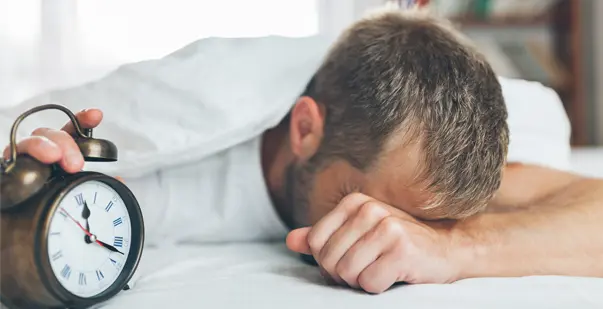We all know that sleep is important. But did you know that not getting enough sleep can hurt your heart? People who sleep less than 5 hours a night are 61% more likely to have high blood pressure compared to those who sleep 7 hours. People also suffer from heart palpitations from lack of sleep. Continue reading to learn about how not sleeping enough can lead to heart problems. Also, learn about life-saving courses that can help in emergencies.
Master ACLS Now
Get ACLS certified with confidence
What is Sleep Deprivation?
When a person sleeps much less than required by their body, they are said to be sleep-deprived. Doctors recommend that as an adult you must enjoy 7 to 9 hours of sleep every day. If you regularly get less than that, you might be sleep-deprived.
Signs of sleep deprivation:
- Feeling tired during the day
- Having trouble focusing
- Being grumpy or moody
- Falling asleep during the day
Read More: First Aid For An Unconscious Person
How Does Sleep Affect Your Heart?
Can lack of sleep cause heart problems? Yes, it can. Your heart works hard all day. At night, when you sleep, your heart gets a chance to rest too. During deep sleep, your heart rate and blood pressure go down. This gives your heart a break.
When you don’t get enough sleep, your heart doesn’t get this rest. Over time, this can lead to heart problems. Let’s look at some of the ways sleep deprivation can hurt your heart.
- High Blood Pressure (Hypertension)
One of the first ways sleep deprivation affects your heart is by raising your blood pressure. When you don’t sleep enough, your body makes more stress hormones. These hormones can make your blood pressure go up. This can lead to other heart problems over time.
How sleep deprivation leads to high blood pressure:
- Your body stays in an alert state
- Blood vessels don’t relax as they should
- Your heart has to work harder
- Heart Disease
Many research shows that regular sleep deprivation can cause heart disease. Heart disease is a blanket term for several medical issues that can affect your heart.
How sleep deprivation contributes to heart disease:
- It can cause inflammation in your body
- It affects the way that your body metabolizes fat
- It can make it harder for your body to control blood sugar
- Heart Failure
Heart failure is when your heart can’t pump blood as well as it should. Sleep deprivation can contribute to the risk of heart failure.
How sleep deprivation can lead to heart failure:
- It puts extra stress on your heart
- It can cause other problems (like high blood pressure) that hurt your heart
- It can affect how your heart muscle works
- Irregular Heartbeat (Arrhythmia)
Can lack of sleep cause palpitations? When you don’t get enough sleep, it can affect your heart’s rhythm. This can lead to an irregular heartbeat, also called arrhythmia.
How sleep deprivation can cause irregular heartbeat:
- It can affect the electrical signals in your heart
- It can make your heart beat too fast or too slow
- It can cause pauses between heartbeats
Some types of arrhythmia can be dangerous. They can increase your risk of stroke or heart failure.
- Heart Attack
Can lack of sleep cause chest pain? Not sleeping well on a constant basis can surely raise the risk of a heart attack. A heart attack happens when blood flow to part of your heart is blocked.
How sleep deprivation can contribute to the risk of a heart attack:
- It can cause inflammation that damages blood vessels
- It affects the body’s capability to handle cholesterol
- It can increase stress on your heart
How Do Life-Saving Courses Help with Heart Problems?
While getting enough sleep is important for preventing heart problems, it’s also good to know how to help if someone has a heart emergency. That’s where life-saving courses come in. Courses like Basic Life Support (BLS), Advanced Cardiovascular Life Support (ACLS), and Pediatric Advanced Life Support (PALS) teach people how to help people in heart emergencies. These courses are really important.
They can help save lives when every second counts. While these courses don’t prevent heart problems from sleep deprivation, they can help save lives if a heart emergency happens. They give people the skills to act quickly and effectively.
Read More: ACLS Cheat Sheet: Your Guide to Passing the Exam
When Should You See a Doctor?
If you’re having trouble sleeping, or if you’re worried about how sleep might be affecting your heart, it’s important to talk to a doctor. Visit your doctor if you see these symptoms or signs-
- You can’t fall asleep or stay asleep
- You feel extremely tired on waking up even if you had enough sleep
- You snore or gasp for air when asleep
- You feel sleepy throughout the day
- You have discomfort or chest pain from lack of sleep
- You think that the heart is racing often
Conclusion
Sleep is more than just rest. It’s a time when your body, including your heart, repairs and recharges. Not getting enough sleep can hurt your heart in many ways. You can suffer from high blood pressure, heart disease, heart failure, irregular heartbeat, heart attacks, and heart palpitations from lack of sleep. The good news is that getting enough good sleep can help







